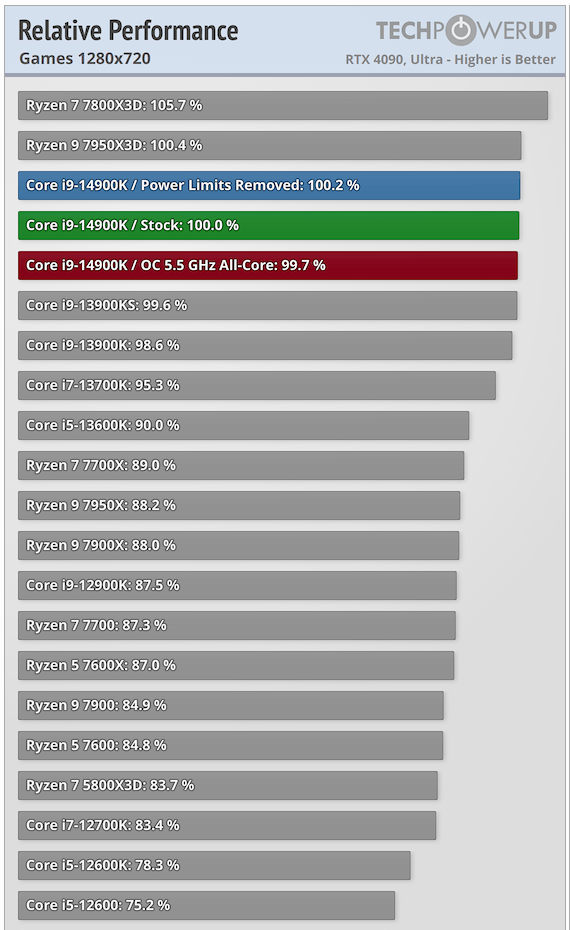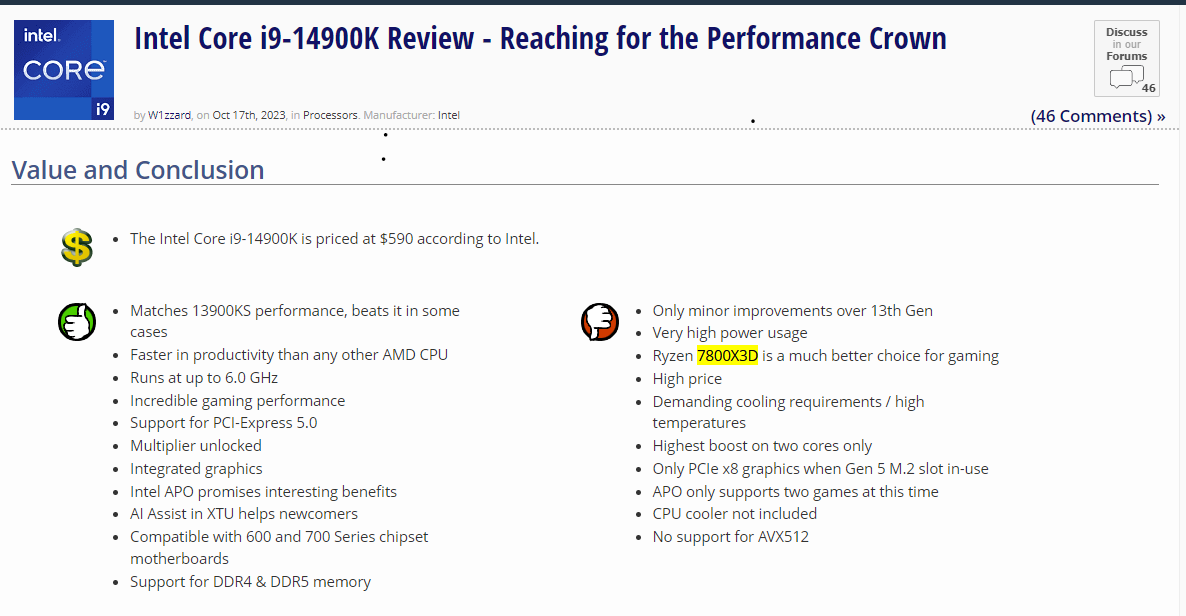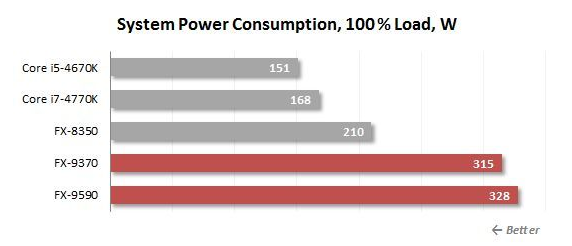erek
[H]F Junkie
- Joined
- Dec 19, 2005
- Messages
- 10,900
That 4K Gaming performance is starting to matter with an 11% difference finally over the 5950x.
“Averaged over the 45 tests in our application test suite, the Core i9-14900K confirms that Raptor Lake is extremely impressive. It achieves performance that's always near the top of our charts. The differences are small though. Compared to the 13900K the performance uplift is 3%, the 13900KS is a tiny bit faster, but a 0.5% difference is close enough to call it even. This means that Intel has only achieved minimal gen-over-gen gains, which in all fairness is not unexpected, and the "refresh" naming suggests this, too. Still, this means that if you're on a 13th Gen high-end CPU like 13900K or 13900KS there is no reason to even think about an upgrade. AMD's offerings are close behind—the Ryzen 9 7950X is only 3% slower, the 7950X3D is 5% behind. The gaming-focused AMD Ryzen 7 7800X3D is over 40% slower in applications—but much more affordable at the same time. The two-generation old Core i9-12900K trails the 14900K by 26%, sizable but probably not enough to justify an upgrade.
Gaming on the Core i9-14900K is extremely impressive, too. Throughout our tests it delivers impressive framerates that are among the highest we've ever seen, just like the 13th Gen top models. Games don't push the CPU power draw to its maximum, so the 350 W power limit of the 13900KS can't make any difference, but the 14900K's 100 MHz clock advantage at higher thread counts can, which makes the 14900K the fastest gaming CPU from Intel. However, the performance uplifts are minimal—1% or less, especially at higher resolutions. Compared to AMD's Zen 4 processors without 3DV Cache, the deltas are around 10%; 5% at 4K. AMD's new Zen X3D processors come with improved gaming performance though. The Ryzen 9 7950X3D runs at virtually the same speed as the 14900K, and the 7800X3D is even a little bit faster at lower resolutions and things even out at 4K. These are tiny differences though—all of these processors will give you fantastic gaming performance. This also applies to "slower" CPUs like the 14700K, 14600K, 13th Gen with large cache, and 12900K, 12700K, other Zen 4 CPUs and more—the FPS differences are so small there really is no meaningful difference, especially at higher resolutions like 4K. There is some noteworthy differences in minimum FPS, but I'm not convinced that these are big enough to really change the experience during actual gameplay and other considerations like pricing and power consumption will be more important.
Just like previous Intel high-end processors, the Core i9-14900K is a power hungry beast. As mentioned before, it is configured with a power limit setting of 253 W, which it can reach easily when loaded with apps that scale to all cores. On average we measured an application power draw of 170 W, which is the second-highest we've ever recorded. Only the 13900KS beats that, with 180 W. The 13900K isn't doing much better either—169 W. It looks like Intel was able to make small improvements to multi-threaded efficiency indeed, because the 14900K's energy efficiency, which takes into account both performance and power draw, is a little bit better than 13900K and 13900KS. Compared to AMD's offerings there's still a night-and-day difference. During rendering, the 14900K consumes 282 W, the 7950X needs 80 W less, while offering virtually the same performance. The 7950X3D even uses only 140 W, which is half of the 14900K, and it's only marginally slower. Similar situation in gaming: 14900K average gaming power of 144 W, 7950X: 89 W, 7950X3D: 56 W, 7800X3D: 49 W (!)—all while offering virtually the same FPS. While I don't think the power cost difference will be a dealbreaker (75 W @ 4 hours per day @ 30 cents/kWh = $33 per year), the added heat dumped into the case and eventually into your gaming cave might make you reconsider.
Cooling such high heat output isn't easy on the CPU cooler either. You'll be hitting 100°C very quickly, which will regularly result in thermal throttling with most air coolers. This is not a huge deal, as modern processors are very good at keeping a certain target temperature by slightly reducing clocks, without performance falling off a cliff—it's still not what you've spent all that money for. A watercooling solution will help, just like increasing the temperature limit, which goes up to 115°C. You could also undervolt the CPU or dial the power limit back, which is something we'll be investigating in a future article, specifically to quantify the performance cost. Things aren't that much better on the Zen 4 side though, because AMD wanted to keep cooler compatibility with Socket AM4, so they had to install an extra thick heat spreader on the AM5 CPUs, which make them difficult to cool, too, but it's easier due to the lower overall heat output.
Although the unlocked multiplier makes overclocking technically easy, it is limited by the cooling system. Even when the thermal limit is raised from 100°C to the maximum of 115°C, it is difficult to push voltage much further, even with an AIO. At least Intel is giving us the option to adjust the temperature limit, AMD has no such feature. Manual overclocking is also complicated by the fact that the low-thread count clocks on two cores are so high (6.0 GHz), while the other cores run at lower speeds and can't even get close. My highest all-core OC was 5.5 GHz, which is slightly worse than stock, because the CPU will run at 5.7 GHz almost all the time by default, plus boost to 6 GHz on two cores.
With this generation, Intel is introducing an AI Assist option for their XTU overclocking utility. At launch, this option is only available on the 14900K, Intel confirmed that they are looking into adding support for the other 14th Gen SKUs, too. AI Assist works surprisingly well, it takes less than a minute to run and will provide you with a good starting point that goes beyond just a fixed multiplier on all cores like we're doing in our OC testing. Unfortunately saving these changes to the BIOS isn't possible, so you'll have to reapply them with XTU on every restart, or manually enter them into your BIOS. A major issue is that XTU does not work with Windows VBS enabled, which is the default on all new OS installations. Still, it's good to see that Intel is making improvements for overclockers. On the other hand, I wish they gave us more manual controls with better BIOS integration, like AMD does.
Intel's biggest "new tech" announcement is their Intel Application Optimization technology, or just "APO." The promise is that Intel will release hand-optimized profiles for specific games to control the thread count and thread type in real-time, which goes beyond what Thread Director offers. Unfortunately Intel was unable to provide reviewers with access to APO, so we couldn't test the technology to verify Intel's claims. Intel did confirm that APO works only on two older games at this time, which is a surprisingly small number of titles for a new release, especially coming from a resourceful company like Intel.
Intel has announced an MSRP of $590 for the Core i9-14900K, which matches the launch pricing of 13900K. In my opinion this is a reasonable approach, because there isn't really much that 14900K offers over the 13900K, especially when you're willing to tweak things a little bit by yourself. 13900K is currently available for $570, I think I would spend the $20 for a little bit of extra performance and better resale value. You could also say that 14900K is a 13900KS with a $100 discount. I'm sure that people will call this a pointless release, but that's not true. You are still getting a top-notch processor that impresses with fantastic performance in all areas—applications and gaming. With the Ryzen offerings you'll have to make more compromises: the 7800X3D is the best processor for gaming, and only $450, but it's a bit slower in applications. The 7950X3D is among the fastest in gaming and applications, but requires custom AMD software for game detection and processor thread management that doesn't always do the right thing. For a more application-focused experience you could opt for the 7950X, but you'll be losing out on a bit of gaming performance due to lack of 3DV cache and the dual CCD design. At the end of the day all these processors are really really good at everything and you'll have a hard time noticing much of a subjective difference. From an Intel perspective, it gives the company something "new" to sell to customers, while they are getting their next-gen architectures ready.
At this time it looks like Meteor Lake isn't coming to the desktop space, mostly because it tops out at just six P-Cores. I think it could still be an amazing release for entry-level and midrange PCs, which is where most of the sales are anyway. The next desktop release for Intel seems to be Arrow Lake, with core counts reaching 8+16, but that's scheduled not before 2024, possibly even later. AMD's Zen 5 is expected to release next year, but we don't know about the improvements yet, I'd still expect that AMD will defend the gaming crown for the foreseeable future. Performance isn't everything though, and if Intel adjusts their pricing, they could spoil AMD's party. It seems likely that we'll be seeing price cuts on 13th Gen processors, which could make them an attractive choice for people who know what they are buying, without looking at model numbers.”

Source: https://www.techpowerup.com/review/intel-core-i9-14900k/28.html
“Averaged over the 45 tests in our application test suite, the Core i9-14900K confirms that Raptor Lake is extremely impressive. It achieves performance that's always near the top of our charts. The differences are small though. Compared to the 13900K the performance uplift is 3%, the 13900KS is a tiny bit faster, but a 0.5% difference is close enough to call it even. This means that Intel has only achieved minimal gen-over-gen gains, which in all fairness is not unexpected, and the "refresh" naming suggests this, too. Still, this means that if you're on a 13th Gen high-end CPU like 13900K or 13900KS there is no reason to even think about an upgrade. AMD's offerings are close behind—the Ryzen 9 7950X is only 3% slower, the 7950X3D is 5% behind. The gaming-focused AMD Ryzen 7 7800X3D is over 40% slower in applications—but much more affordable at the same time. The two-generation old Core i9-12900K trails the 14900K by 26%, sizable but probably not enough to justify an upgrade.
Gaming on the Core i9-14900K is extremely impressive, too. Throughout our tests it delivers impressive framerates that are among the highest we've ever seen, just like the 13th Gen top models. Games don't push the CPU power draw to its maximum, so the 350 W power limit of the 13900KS can't make any difference, but the 14900K's 100 MHz clock advantage at higher thread counts can, which makes the 14900K the fastest gaming CPU from Intel. However, the performance uplifts are minimal—1% or less, especially at higher resolutions. Compared to AMD's Zen 4 processors without 3DV Cache, the deltas are around 10%; 5% at 4K. AMD's new Zen X3D processors come with improved gaming performance though. The Ryzen 9 7950X3D runs at virtually the same speed as the 14900K, and the 7800X3D is even a little bit faster at lower resolutions and things even out at 4K. These are tiny differences though—all of these processors will give you fantastic gaming performance. This also applies to "slower" CPUs like the 14700K, 14600K, 13th Gen with large cache, and 12900K, 12700K, other Zen 4 CPUs and more—the FPS differences are so small there really is no meaningful difference, especially at higher resolutions like 4K. There is some noteworthy differences in minimum FPS, but I'm not convinced that these are big enough to really change the experience during actual gameplay and other considerations like pricing and power consumption will be more important.
Just like previous Intel high-end processors, the Core i9-14900K is a power hungry beast. As mentioned before, it is configured with a power limit setting of 253 W, which it can reach easily when loaded with apps that scale to all cores. On average we measured an application power draw of 170 W, which is the second-highest we've ever recorded. Only the 13900KS beats that, with 180 W. The 13900K isn't doing much better either—169 W. It looks like Intel was able to make small improvements to multi-threaded efficiency indeed, because the 14900K's energy efficiency, which takes into account both performance and power draw, is a little bit better than 13900K and 13900KS. Compared to AMD's offerings there's still a night-and-day difference. During rendering, the 14900K consumes 282 W, the 7950X needs 80 W less, while offering virtually the same performance. The 7950X3D even uses only 140 W, which is half of the 14900K, and it's only marginally slower. Similar situation in gaming: 14900K average gaming power of 144 W, 7950X: 89 W, 7950X3D: 56 W, 7800X3D: 49 W (!)—all while offering virtually the same FPS. While I don't think the power cost difference will be a dealbreaker (75 W @ 4 hours per day @ 30 cents/kWh = $33 per year), the added heat dumped into the case and eventually into your gaming cave might make you reconsider.
Cooling such high heat output isn't easy on the CPU cooler either. You'll be hitting 100°C very quickly, which will regularly result in thermal throttling with most air coolers. This is not a huge deal, as modern processors are very good at keeping a certain target temperature by slightly reducing clocks, without performance falling off a cliff—it's still not what you've spent all that money for. A watercooling solution will help, just like increasing the temperature limit, which goes up to 115°C. You could also undervolt the CPU or dial the power limit back, which is something we'll be investigating in a future article, specifically to quantify the performance cost. Things aren't that much better on the Zen 4 side though, because AMD wanted to keep cooler compatibility with Socket AM4, so they had to install an extra thick heat spreader on the AM5 CPUs, which make them difficult to cool, too, but it's easier due to the lower overall heat output.
Although the unlocked multiplier makes overclocking technically easy, it is limited by the cooling system. Even when the thermal limit is raised from 100°C to the maximum of 115°C, it is difficult to push voltage much further, even with an AIO. At least Intel is giving us the option to adjust the temperature limit, AMD has no such feature. Manual overclocking is also complicated by the fact that the low-thread count clocks on two cores are so high (6.0 GHz), while the other cores run at lower speeds and can't even get close. My highest all-core OC was 5.5 GHz, which is slightly worse than stock, because the CPU will run at 5.7 GHz almost all the time by default, plus boost to 6 GHz on two cores.
With this generation, Intel is introducing an AI Assist option for their XTU overclocking utility. At launch, this option is only available on the 14900K, Intel confirmed that they are looking into adding support for the other 14th Gen SKUs, too. AI Assist works surprisingly well, it takes less than a minute to run and will provide you with a good starting point that goes beyond just a fixed multiplier on all cores like we're doing in our OC testing. Unfortunately saving these changes to the BIOS isn't possible, so you'll have to reapply them with XTU on every restart, or manually enter them into your BIOS. A major issue is that XTU does not work with Windows VBS enabled, which is the default on all new OS installations. Still, it's good to see that Intel is making improvements for overclockers. On the other hand, I wish they gave us more manual controls with better BIOS integration, like AMD does.
Intel's biggest "new tech" announcement is their Intel Application Optimization technology, or just "APO." The promise is that Intel will release hand-optimized profiles for specific games to control the thread count and thread type in real-time, which goes beyond what Thread Director offers. Unfortunately Intel was unable to provide reviewers with access to APO, so we couldn't test the technology to verify Intel's claims. Intel did confirm that APO works only on two older games at this time, which is a surprisingly small number of titles for a new release, especially coming from a resourceful company like Intel.
Intel has announced an MSRP of $590 for the Core i9-14900K, which matches the launch pricing of 13900K. In my opinion this is a reasonable approach, because there isn't really much that 14900K offers over the 13900K, especially when you're willing to tweak things a little bit by yourself. 13900K is currently available for $570, I think I would spend the $20 for a little bit of extra performance and better resale value. You could also say that 14900K is a 13900KS with a $100 discount. I'm sure that people will call this a pointless release, but that's not true. You are still getting a top-notch processor that impresses with fantastic performance in all areas—applications and gaming. With the Ryzen offerings you'll have to make more compromises: the 7800X3D is the best processor for gaming, and only $450, but it's a bit slower in applications. The 7950X3D is among the fastest in gaming and applications, but requires custom AMD software for game detection and processor thread management that doesn't always do the right thing. For a more application-focused experience you could opt for the 7950X, but you'll be losing out on a bit of gaming performance due to lack of 3DV cache and the dual CCD design. At the end of the day all these processors are really really good at everything and you'll have a hard time noticing much of a subjective difference. From an Intel perspective, it gives the company something "new" to sell to customers, while they are getting their next-gen architectures ready.
At this time it looks like Meteor Lake isn't coming to the desktop space, mostly because it tops out at just six P-Cores. I think it could still be an amazing release for entry-level and midrange PCs, which is where most of the sales are anyway. The next desktop release for Intel seems to be Arrow Lake, with core counts reaching 8+16, but that's scheduled not before 2024, possibly even later. AMD's Zen 5 is expected to release next year, but we don't know about the improvements yet, I'd still expect that AMD will defend the gaming crown for the foreseeable future. Performance isn't everything though, and if Intel adjusts their pricing, they could spoil AMD's party. It seems likely that we'll be seeing price cuts on 13th Gen processors, which could make them an attractive choice for people who know what they are buying, without looking at model numbers.”

Source: https://www.techpowerup.com/review/intel-core-i9-14900k/28.html
![[H]ard|Forum](/styles/hardforum/xenforo/logo_dark.png)



